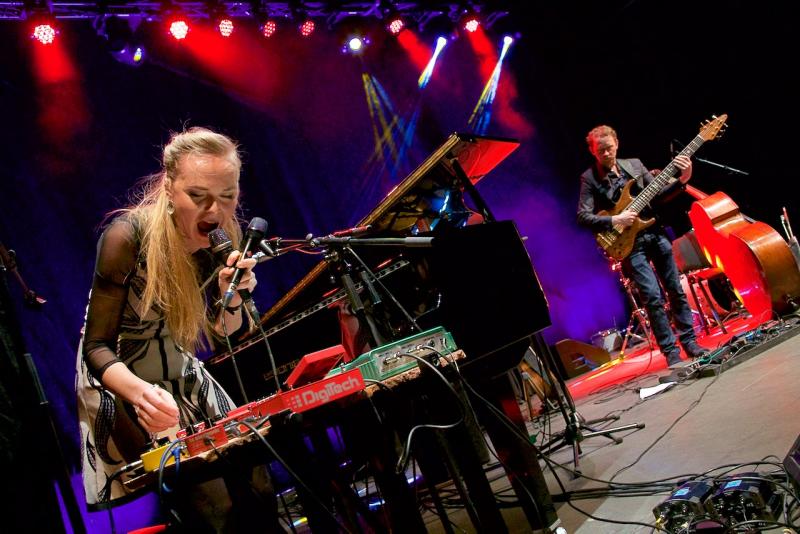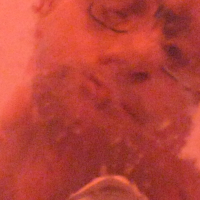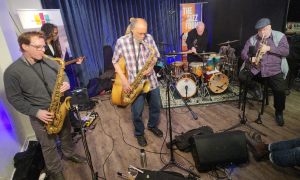Home » Jazz Articles » Live Review » Tallinn Music Week 2017
Tallinn Music Week 2017

Tallinn, Estonia
March 30-April 1, 2017
Although running for the advertised week, this festival-cum-conference concentrates its actual showcase concerts over an intense three-day period. The remaining days are taken up with art exhibitions, food-tasting sessions, and conference/seminar/talk events. Besides the delegate and general ticketed programmes, there is also a City Stage element, where freebie gigs manifest themselves around Tallinn. The scale of TMW is very impressive, with its attendees seeming to arrive mostly from the northern European regions, from the UK across to Russia. Most of them are music biz types, whether promoters, managers, agents, publishing or record company employees. Much of the festival happens just outside the Old Town (Vanalinn), in the Nordic Hotel Forum, or on the other side of the tracks, at the Telliskivi Creative City, accustomed home of Tallinn's Jazzkaar festival. There are also several small venues actually in the Old Town, so the city is thoroughly inhabited for the duration.
The opening concert was held in another outer haunt, the Kultuurikatel, a converted power station with attendant hardcore industrial chic chimney. Its chief set came courtesy of Danielle De Picciotto and Alexander Hacke, the latter mostly known as an old member of Einstürzende Neubauten (he joined in 1980, at age 14), that mighty German urban grind combo, masters of drilling, hammering, pounding and creatively-tuned guitar eruptions. The following day, this ex-Berlin pair were interviewed by journalist and musician John Robb, probing their recent tendency towards nomadic living, and its effect on their music. This Thursday evening, they simply demonstrated that existence via sonic disruption, as Hacke hurriedly chopped out real-time guitar loops, then switched to booming his single floor-tom, again cracking out further repeats, immediately altered or tweaked via his laptop and hands-on (or rather, drumstick tip-on) screen-pad. Picciotto had a more direct time, mostly swelling out violin lines, enveloping Hacke's barrage, soothing it around the perimeter.
In the afternoon of the second day, we could sight Flamingods playing a City Stage freebie, just across the street in the Viru Keskus shopping centre. They're a rapidly developing UK/Bahrain band, now trimmed down to a quartet core, and best described as an ethno-hippy-alternative rock combo, perched as they are on the intersection between strumming singer-songwriter, flighty dance-pulse and orientalist fantasists. Even though their roots aren't quite discernible, and their style is un-graspable, this band have honed their music considerably since your scribe last caught them at the Green Man festival in the summer of 2016. The band must surely have initially been doubtful about just turning up to play in a Thursday afternoon shopping mall environment, but as the 30 minute set unwound (most sets during TMW are such a length, in the showcase tradition), it was clear that many audience members had specifically turned up to see them, and even those who looked like they'd wandered along at random soon appeared to be captivated. There's much swapping around of instruments, between guitars, keyboards and drums/percussion, with frontman and main singer Kamal Rasool often plinking along on his small saz/lute-type instrument. Just when a song might sound containable, it's gliding off into another direction, mostly the Middle East, or further down in South East Asia, then back up to London, or across to NYC.
After the opening concert, there are two evenings of intense showcase sessions, with multiple choices to be made, but studying the programme, your scribe elected to concentrate entirely on the sessions at Vaba Laba, a venue in the Telliskivi Creative City, already familiar as one of the chief locations used by the Jazzkaar festival every April. The Friday night showcase was indeed organised by Jazzkaar (and the Estonian Jazz Union), acting as a preview for the 10-day festival which would follow around three weeks later. Here, some of the finest Estonian artists delivered teaser sets, peppered with a few visiting acts from beyond. Indeed, your scribe already has a couple of fave artists from Tallinn, and both of these performed in the early stages of the evening: guitarist Jaak Sooäär and singer/pianist Kadri Voorand.
Sooäär can alter his style and texture according to the setting, and his trio with the Armenian bassist Ara Yaralyan and Finnish drummer Markku Ounaskari requires a softer sound, more in keeping with the jazz tradition. In other bands Sooäär can be rocky, gritty and aggressive. For this set, he focuses on twanging pools of thoughtfulness, interacting subtly with his playing partners. Voorand plays in a duo with bassist Mihkel Mälgand, although she's always the absolute centre of attention. The jazz tradition is also in evidence here, but Voorand doesn't alight on it for long, always restlessly flying off into a bout of abstract vocal improvisation, or reciting Estonian poetry, or creating an imaginary intercom announcement (this last was a composition-in-the-moment, inspired that very day), her voice flitting from purist acrobatics to electronics-filtered extremes. All of her vocal perversion is in real-time, as she resourcefully knits a construction of rhythmic repeats, or flicks on a horrific distortion effect, often snapping back into something profoundly unsettling in its depth of contrast. Meanwhile, she's back at the piano, marrying voice and keys in a completely symbiotic existence.
On the stage 'next door' (the two stages were set back-to-back, the audiences moving along the created 'corridor' between the pair, as each act alternated in the spaces) a discovery was about to be made, your scribe missing the first ten minutes of Robert Jürjendal and Kaido Kirikmäe's set. With performances so constant, having an almost instantaneous changeover time, any refreshment break can result in missing half an artist's set. Fortunately, your scribe caught enough of this guitar/electronics pair to be converted. At times, Kirikmäe seemed to be taking Jürjendal's guitar matter and shaping it live into an electronic cloud, responsive and sympathetic. The pair's ambient surround possesses a brooding darkness, slow-shifting and twinkling in space.
At 11.30pm, the UK's WorldService Project provided a powerful burst of prog-jazz to wind up the session, all garbed in military uniforms, hopefully with a sense of irony, but also perhaps not the best-advised gear when considering their general bounding about whilst reproducing tunes of manic complexity and speed-riffing excess. Their weapons are tenor saxophone, trombone, keyboards, bass, drums and the occasional vocal chorus. Compositionally, this London gang are dominated by keysman Dave Morecroft, and his soloing is also a heavily featured aspect of the show. During the four-or-so years since your scribe had last witnessed them, some of the nerve-twitching edges have been sanded down into a liberally-oiled staccato-hammer machine. WSP have slapstick humour, and perhaps a tad too much of this (would even Frank Zappa have approved of going this far?), but they still offer a spirited, virtuoso collision between jazz, gypsy, circus, mod classical and speed metal, schizo changeling movements abounding.
For post-midnight entertainment, the converted Balti Jaam train station was acting as an all-night electronica venue, with further English delight in the shape of the London-living Pearson Sound (previously known as Ramadanman, and even David Kennedy), inhabiting the twisting, contorting end of the line, his sound now having moved on from dubstep towards some hinterland of found parts, funked, dislocated, blobby and relentless. Everything covered for an after-hours, pre-bedding wind-down.
Saturday's Viljandi Folk Music Festival Night also utilised the twin-stage set-up at Vaba Lava. Here, the acts were more varied, still featuring many Estonians, but also opening up to visitors from Cape Verde, Poland and Russia. This provided an engagingly unfamiliar form of traditional music, unearthing roots that are less common to those accustomed to folk festivals in western Europe and the USA. The Cape Verdean singer and acoustic guitarist Tcheka brought a light frothiness to the early evening, although his airy songs did have a cumulative, soporific effect. What was needed was a sudden burst of Estonian bagpiping, courtesy of Duo Malva Ja Priks. This pair's primary tools are drumkit and accordion, but Kulno Malva sometimes inflates his pipes, the percussion of Kristjan Priks adding a regular foundation to the almost orchestral-sounding wind-and-wheeze instruments. This was a hardcore goat-herding folk sound, but it seemed likely that the duo also compose, or at least heavily arrange, their own material.
Mari Kalkun hails from the south of Estonia, an area that's rich in folk tradition. She's become established as one of the country's eminent roots artists over the last couple of decades. Kalkun's set skirted the edges of purist acoustic simplicity and altered foot-pedal vocal construction, even if the end results of the latter still sounded quite old-fashioned. It's just the method that's aided by technology, as the songs still retain an old vintage aura. She's a multi-instrumentalist, but favours the kannel, a small Estonian zither.
The oddly-named Curly Strings turn out to be a slick bunch of Nashville impersonators, penning original tunes that sound like they're lifted wholesale from the roots country and bluegrass past, with words sung in Estonian. This is a concept that won't travel far outside the country, given that most folks would rather hear these kind of songs delivered in some approximation of an American accent. Technically, the Curlies delivered the goods, but this is a band that's very much for domestic consumption only.
The gentle subversion of folk tradition seems to be a theme shared by several bands during this evening. From Poland, the all-female trio Sutari employ vocal harmonies that resonate with ancient technique, swapping around instruments with an eccentric stance, but whipping out their kitchen implements to re-interpret via electric whisk and cheese grater, in a domestic equivalent to Hacke's Einsters. There's an attractive harshness to the vocal harmonies, and a constantly mischievous slant to Sutari's antics.
Sooäär and Voorand returned, to reprise a band (and a project) that debuted at last year's Jazzkaar festival, joined by second singer Liisi Koikson and second guitarist Paul Daniel, in a programme devoted to the folk-inspired choral music of the recently departed Estonian composer Veljo Tormis. An entire choir is compacted into a twin-voice, two-guitar format, with Voorand doctoring her vocals electronically on a few of the pieces, in a very extreme distorto-fashion. Likewise Sooäär and Daniels, who engage in the odd bout of clipped riffing confrontation, before snapping back to a more reflective composure. This quartet produces a gripping combination of calm and chaos, radically re-configuring the Tormis canon.
Once again, a Polish outfit was set to ignite the stage, this time with their spirited gypsy mazurka reeling. Janusz Prusinowski astounded with his vigorously virtuoso fiddling, leading a storming of that all-important 11.30pm stage-slot. Then, the Estonian/Belgian foursome Estbel calmed the atmosphere down with an accessible folksiness that was reminiscent of certain UK combos, where the tradition is leavened by a popular song presentation. Estbel made a successful balance, but perhaps should have played earlier in the evening, surrounded as they were by Prusinowski and the soon-coming Russian madmen Otava Yo.
This last Saint Petersburg bunch unfastened their furry hats, and romped off in a fashion that suggested The Pogues in approach, most likely with a similar love of heavy alcohol. Could vodka beat whiskey? Maybe easily. Otava Yo's madcap Soviet stomp antics didn't interfere with their musical substance, their identical cotton vests allowing the sweat to flow freely, their curious mix of frontmen implying a love of imported Three Stooges videos. Surely these aren't the same kind of Russians that are threatening to invade Estonia? Soon, the crowd was subject to a long snake of dancers, weaving around in circles, as the tunes became ever more frantic. It was a fine way to climax an excellent weekend of music, so many bands flitting past in their allotted 30 minutes, most of them understanding perfectly well how to compress their performing ethos into a representative dosage.
Photo Credit: Matti Komulainen
Tags
PREVIOUS / NEXT
Support All About Jazz
 All About Jazz has been a pillar of jazz since 1995, championing it as an art form and, more importantly, supporting the musicians who make it. Our enduring commitment has made "AAJ" one of the most culturally important websites of its kind, read by hundreds of thousands of fans, musicians and industry figures every month.
All About Jazz has been a pillar of jazz since 1995, championing it as an art form and, more importantly, supporting the musicians who make it. Our enduring commitment has made "AAJ" one of the most culturally important websites of its kind, read by hundreds of thousands of fans, musicians and industry figures every month.
























